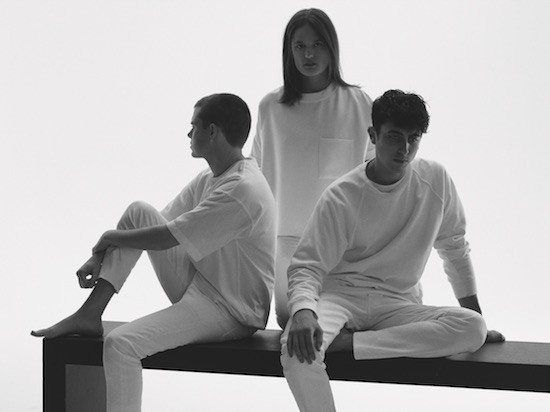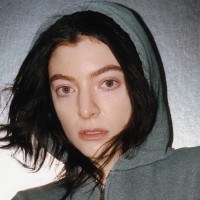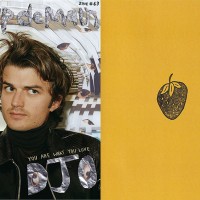Interview: 2016 Must-Know - Wet
Interview: 2016 Must-Know - Wet

Wet's Kelly Zutrau and Marty Sulkow have been bustling from show to show with Tobias Jesso Jr., and when I finally sat down with them in San Francisco, Zutrau was nursing the beginnings of a bad cold which later manifested itself in her performance on stage. Ever the trooper, Zutrau took a shot of whiskey in between synth-laden songs and thanked the crowd for their hospitality in a genuine style that seems to characterise everything Wet does as a band.
Since the release of their debut EP, Wet has consistently drawn comparisons to '90s R&B - an era of lyrics so emotionally honest they are now often appreciated more as karaoke standards than the complex, heartfelt anthems that '90s kids soundtracked their lives to. But that frankness is refreshing in Zutrau, Sulkow, and Joe Valle's case. "All I ask of you," Zutrau sincerely pleads on 'Weak', "is baby, please don't leave me." They are part of a curious storm of indie-pop that has fascinated cultural critics and music reviewers alike, and Zutrau and Sulkow were game to offer their take on the industry, production, and sea turtles alike - all whilst drawing impressive self-portraits.
"...when you look in a mirror you see so many things in your own face - little subtle things that you would point out to someone else, and they wouldn't know what you're talking about. We see our music in such a complex way. We've thought about it so much that it's hard to be objective about your own music."

CDM: Congrats on the upcoming album! We're all really obsessed with 'Weak' and excited for the album, 'Don't You'. You've said that the EP is full of break-up songs. Has writing this album shifted your perspective on relationships? 'Weak' sounds like a break-up song but has a dreamy, optimistic layer that's characteristic of your overall sound.
KELLY ZUTRAU: Making the album hasn't shifted my perspective on relationships, but the way that I write music is very specific to what's going on in my life. It's pretty direct - just processing real things happening to me, so when I wrote the songs for the EP I was going through a really big, bad break-up. It was kind of a year-long thing. It was one of those things. The album was done over a longer period of time, so it's a little more complex. The are some break-up songs. I would say the break-up songs on this album are a little more complicated. They touch on the break-up as part of the relationship, or part of the break-up that's gonna come. But there's other stuff going on as well.
CDM: You were able to start doing this music when you had part-time jobs. Marty, you were a voting-machine repairman and so was Joe. Now you're able to pursue this full-time--
KELLY: We weren't doing music full-time when we made the EP. I was a nanny in Brooklyn.
CDM: Did your intentions shift at all when you were able to do this full-time? Has devoting all of your attention and energy to this project added a new intensity or pressure?
MARTY SULKOW: It was a different experience before - it was just finding time to work on music. I would say the biggest difference is that you have to regiment your time differently.
KELLY: I feel like it's so lucky and so grew to be able to do just music. But I have noticed that when music was what I did in my free time, it was a little bit more enjoyable in some ways. I would go to my job and music was what I would do for fun, like as a relief for my monotonous week. Now I do feel like because I wanna be writing songs at all times, it can be like I have more writer's block. It's my job. I notice it more when I'm distracted on tour. When I'm at home and it's natural, that's when I write more songs.

CDM: How do you overcome writer's block? Or the production equivalent of writer's block?
KELLY: I just write bad songs until a good one comes.
MARTY: I would say with production, it's a little bit easier because it's instrumentation. Joe and I have each other also to complicate each other's ideas. It's a different paradigm.
CDM: 'Dreams' is one of my favourite songs, period. I think it speaks a lot to the restlessness and futility you can feel in your twenties - not quite understanding your feelings or how to express them. Do you think those feelings go away as you get older?
MARTY: I don't feel like it goes away.
KELLY: I feel a lot more comfortable with that feeling at this point in my life, and I don't expect it to go away. I've just sort of resigned to feeling like that.
CDM: Your music is characterised as '90s R&B-tinged' a lot. What about that era of music is most exciting to you?
KELLY: I don't know what it is exactly I love about it, other than it was the first music I truly loved in middle school. I was in a singing group, and we sang SWV songs and Destiny's Child songs and Usher songs. I just remember loving them so much, and that just never went away for me. I love the stacked harmonies and the precision in them, and the vocal ranges that are usually on display. The production on them is usually a little bit cheesy, but it also feels not as cheesy as pop music. It's a mixture of cheesy and really real to me. It's just the first music I really liked. I think it's interesting that people see that more than anything else, because I feel like there's so much other music that we like and are influenced by. But I do think that it's more true about the EP and you'll feel that connection more with the EP. It's partly because we worked with Noah Breakfast - he co-produced that EP, and I think he's really good at doing smooth R&B production. That's part of what people are feeling.
CDM: If most people point to '90s R&B as inspiration for the EP, what do you think they'll hear as inspirations for the album?
MARTY: It's really hard, because the stuff that people come up with, you could never really expect. You never know what connections people will draw.

CDM: What was the most surprising connection to you?
MARTY: There were a lot of people who drew comparisons to Chvrches and Haim, which felt very far away to me.
KELLY: I think it's really hard, because when you look in a mirror you see so many things in your own face - little subtle things that you would point out to someone else, and they wouldn't know what you're talking about. We see our music in such a complex way. We've thought about it so much that it's hard to be objective about your own music. I see the Chvrches and the Haim connection. That's not what I think of when I think of our music, but I totally see it. For this album, I really don't know what people will say. I've been thinking a bit about Beck's most recent album, partly because of who mixed it - Tom Elmers mixed it, and also mixed our album. There's bits of it that remind me of our album too.
MARTY: Two things that people have brought up to me recently were Annie Lennox and Björk. Both of those came up recently, which is interesting and chill.
CDM: Who were the first people you sent the album to after it was mixed and finished?
KELLY: We kind of had people in and out during the process of making it. In the last day of mixing, we had a group of friends come in and listen to the whole album mixed. It was really nice - we drank champagne. They gave minimal feedback though.
CDM: Pop is a constantly changing landscape, and it's getting a more critical analysis and dissection than ever before. What does being a pop group in 2015 mean to you? Do you feel like that genre best describes your sound?
MARTY: I was reading a review in Pitchfork of the new Chvrches record, and I thought there was a really, really interesting line where they talked about how for all the infectious pop hooks in that record, there's a lot of ways this album is so much more conservative than what Kanye and Taylor Swift and Rihanna are putting out. I think that's a really interesting thing to say. It's true.
KELLY: It's more traditional structures.
MARTY: The stuff that Kanye and Rihanna are putting out is crazy and so forward-thinking. I wonder if there is this thing that exists in the crossroads between indie and pop, where because indie people are aspiring to straight up pop--
KELLY: We're trying to be more pop than straight-up pop artists, who are trying to push the envelope and be avant-garde.
CDM: The New Yorker wrote an article on Carly Rae Jepsen and the rise of the "major indie" artist. You sort of fit into that category now, since you've signed to Columbia Records. The author pointed out that the labels try to sustain the grassroots fandoms that supported those artists in the first place. How would you characterise your fans? Do you feel like that's the strategy your label has used?
MARTY: As far as the way that Columbia has treat us, they've been incredibly supportive of us and haven't ever tried to make us something that we don't want to be. At the same time, I don't think they've made any great effort to preserve any type of indie cred.
KELLY: They've been pretty hands-off with us creatively, and about our image. They really haven't pushed anything on us. I think the reason that they signed us is because they saw we were generating some buzz ourselves, and we had some fans. I haven't noticed them pushing us in any which way. Being signed to a major label definitely made us think about our album in a different way. We've thought a lot about what it should sound like, in the way that hopefully I don't think we'll ever do again. It was just intense and hard making a first album with a lot of different people in mind. It just basically put a lot of pressure on us, and I would say that there's a song or two that ended up being on the album that I wouldn't have included myself. Those tended to be the poppier songs.
CDM: Did you feel okay with that in the end?
KELLY: In the end, I feel good about it. It is what it is. I think the next album will be really different and a little less pop-y. That's what I imagine. I don't even know if this album is pop-y. It's really hard to know how your music is coming off. We wanted to get a song that could maybe someday be played on the radio, and some effort was put into that. But it wasn't my favourite song.
CDM: But you didn't feel like that made the album a huge departure from what you originally had envisioned?
KELLY: No, not at all. It still fits into the world of the rest of the songs.
HOW I FEEL ABOUT THE ALBUM...


CDM: This album was recorded outside of New York City, in the woods in Massachusetts. You're very much associated with the Brooklyn 'hipster' scene in a lot of ways. How do you think being removed from that environment influenced the sound of the album?
KELLY: I think it made us do more of it ourselves, because we didn't have the community of producers or musicians that we have in New York. We just focused in and tried to do as much of it as we could ourselves out there. I don't know how that affected the sound, but it effected the sound of the album. It's mostly self-produced and all written by us. Being in a place where there's more time to breathe and reflect, and not going to shows and obsessing over what other people are making, was good. But I think there are times where it's necessary to go back and see what other people are doing, and go into a studio with other people. It's inspiring and it keeps you growing as a musician. I feel like there's a balance.
MARTY: You're also just bored. There's not some awesome rooftop party for you to go to.
CDM: Do you find it easy to enter into that community and meet people to collaborate with? It seems like a small world - like Dev Hynes has collaborated with half the population of Brooklyn, it seems.
MARTY: It's small at a certain level.
KELLY: We've never worked with Dev Hynes. I feel like part of that, but also not necessarily a part of that. He obviously could know anyone he wants to know. I don't think we felt like we were at that point when we were in New York. We knew a lot of amazing musicians and producers, but there were still a lot of people that felt not within our reach. But it is really cool to be around people making cool stuff.
CDM: In Duncan Cooper's The Fader article on Wet, he zoomed out to the greater landscape of indie and pop, and how self-production has democratised pop in a certain way. Do you feel like that's true - has self-production democratised the industry in any way?
MARTY: It's hard for us to comment on that specifically, because we're not so old that we didn't grow up in a world where that was already becoming the case. Anyone can buy or pirate Ableton and stuff.
KELLY: But I still do think there's a very clear distinction between radio-pop music and things that other people are doing that we're calling pop music. We couldn't make a song that sounds like a Max Martin song or a Dr. Luke song. We would have no idea how to do that. There's still a formula that people have down. But I do agree with him - pop has become a broader thing.


WET's debut album 'Don't You' is out January 29th, 2016.
Watch the music video for 'Weak' below...




















